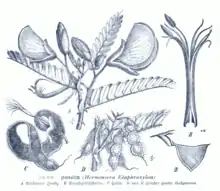Aeschynomene elaphroxylon
Aeschynomene elaphroxylon, also known as an ambatch, pith tree or balsa wood tree, is a common large shrub to small tree of the genus Aeschynomene in the family Fabaceae. It can grow up to 9 m high, with spiny stems, and pairs of substantial thorns under the base of leaves.[1]
| Aeschynomene elaphroxylon | |
|---|---|
 | |
| D. Branch with pods of A. americana. E. Pod of A. trigonocarpa. | |
| Scientific classification | |
| Kingdom: | |
| (unranked): | |
| (unranked): | |
| (unranked): | |
| Order: | |
| Family: | |
| Genus: | |
| Species: | A. elaphroxylon |
| Binomial name | |
| Aeschynomene elaphroxylon | |
A. elaphroxylon is indigenous to parts of tropical Africa. It typically grows by water and in waterlogged soils.[2][3]
The seeds of A. elaphroxylon have been known to stay viable after being buried for a few years in the waterlogged banks where it grows well.[4] The seeds are contained in pods that grow in flattened, erect spirals on the tree. The tree has nitrogen fixing nodules in its stem.[3]
In Ethiopia, the species can be found in the Lake Tana and Nechisar National Park. In Lake Tana around gorgora and near bay kebeles in easterner part of gorgora, the plant is rapidly invading the lake [5]
References
- Arbonnier, Michel (2004). Trees, Shrubs and Lianas of West African Dry Zones. Quae. ISBN 2-87614-579-0.
- Burkill, H.M. 1985. The useful plants of west tropical Africa, Vol 3
- Dommergues, Y.R.; G.H. Diem (editors) (1982). Microbiology of Tropical Soils and Plant Productivity. Springer. ISBN 90-247-2624-7.CS1 maint: extra text: authors list (link)
- Fraser, Lauchlan H.; Paul A. Keddy (editors) (2005). The World's Largest Wetlands: Ecology and Conservation. Cambridge University Press. ISBN 0-521-83404-X.CS1 maint: extra text: authors list (link)
- Nechisar National Park Archived 2013-10-28 at the Wayback Machine, Realethiopia.com, January 4, 2006, Retrieved on June 22, 2008
External links
- Dressler, S.; Schmidt, M. & Zizka, G. (2014). "Aeschynomene elaphroxylon". African plants – a Photo Guide. Frankfurt/Main: Forschungsinstitut Senckenberg.